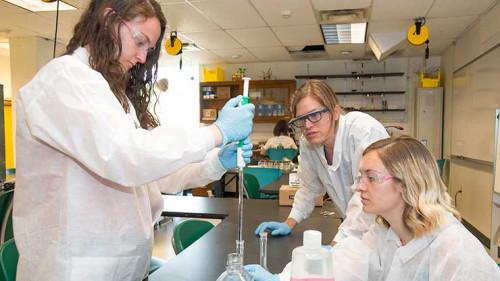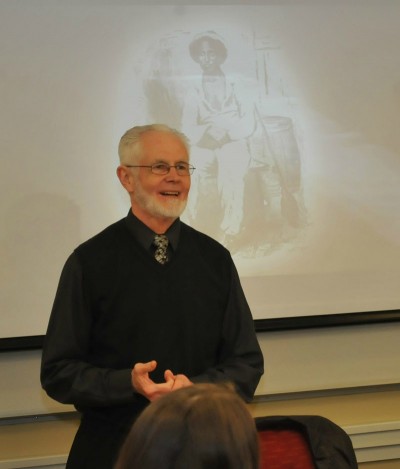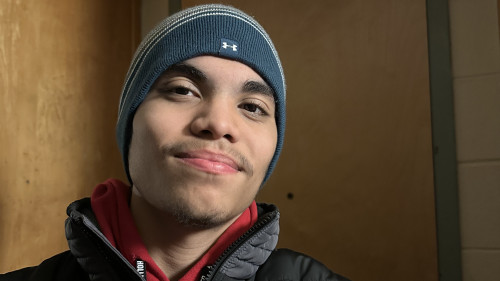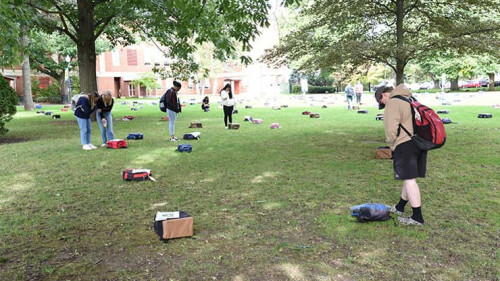

Erin DeGregorio ’16
While history is often read about in textbooks and seen through old pictures, a sociology course at Siena this spring semester highlights how history is living and breathing right here on our own campus.
Paul Murray, Ph.D., professor of sociology, is currently teaching a course, titled “The Civil Rights Movement,” which explores the meaning, legacy, and contemporary relevance of the struggle for civil rights during the 1950s and 1960s. Held once a week on Tuesdays from 6 to 9 p.m., students of the course are learning from veterans of the movement; hearing first-hand accounts and experiences from panelists and guest speakers; watching important documentary films; and learning Freedom Songs that express the emotions of Movement participants on a weekly basis.
But what makes this course so unique is that it is open to the public. Interested community members can join the class discussions from 7 to 9 p.m., because Murray wants all to learn and participate in this subject.
"It embodies what Siena really is to me, a learning community. So often we sit in courses with the same faces day to day, similar experiences, backgrounds and opinions - Dr. Murray's Civil Rights Movement class integrates the real life experiences of Civil Rights Movement veterans as well as community members, allowing for a more dynamic and engaging class,” said Emily Heald ’17, elaborating on what makes this course so different from others she has taken in the past. “This class is not just about reading from a text book or listening to a lecture, it is about sharing the legacy and the memory of this movement and sharing knowledge. This class provides it's students with a variety of perspectives that make everyone involved eager to return."
“It’s instructive for credited students to see others show up for their own interests,” said Murray, who has taught the course for 30 years at Siena. “This course is an opportunity for a conversation across generations, and allows community people to appreciate what goes on here at Siena.”
More than 30 guests, including Guilderland High School students and senior citizens, attended the January 26 session, when a panel of southern natives shared their experiences growing up in the segregated South.
“My involvement in the Civil Rights Movement during the 1960s has had many lasting consequences for my personal and professional life,” said Murray. “The first is a deep commitment to racial equality. Second is a strong concern with social justice issues and support of movements advancing the rights of women, minorities, gays, and lesbians. Third is a lifelong quest to understand the dynamics of social movements. This course is an expression of these commitments.”
During his junior year of high school in Grosse Pointe, Michigan, Murray was selected by one of his teachers to attend a citywide “brotherhood” assembly sponsored by the National Conference of Christians and Jews. There he met African American students from inner city schools, and listened to speakers discuss the emerging Civil Rights Movement. From that point on he had a strong and growing interest in civil rights, and knew he wanted to make a difference.
After graduating from high school in 1962, Murray attended the University of Detroit, where he became more deeply involved in civil rights. He was president of the Human Relations Club, an organization of college students who led discussions on race relations to local high school students. On June 23, 1963, Murray was among the 125,000 people who joined Martin Luther King, Jr., in a “Walk to Freedom” down Detroit’s main street, where he also heard Dr. King deliver an early version of his “I Have a Dream” speech. In the summer following his college graduation, Murray spent two months working with the American Friends Service committee in rural Madison County, Mississippi, an experience that confirmed his dedication to the cause of civil rights.
In 2011 Murray organized and escorted a group of high school and college students on a trip down south to retrace the route of the Freedom Riders. In 2014 he also led another Civil Rights study tour to Mississippi for the 50th anniversary of Freedom Summer, which was a “powerful experience” for all who participated.
"Dr. Murray has channeled his experience, knowledge, and passion in a way that engages young people in the preservation of the reality of the Civil Rights movement,” said Heald. “I am thankful for this opportunity, it will definitely go down in the books as one of the most memorable educational experiences that I have had."
In addition to the nine remaining class sessions, Murray has invited Sister Barbara Lum, SSJ to share her experiences working in Selma, Alabama, during the voting rights campaign led by Dr. Martin Luther King, Jr. Sister Barbara was one of several religious women profiled in the documentary film, “Sisters of Selma.” The event, co-sponsored by the Damietta Cross-Cultural Center and the Sr. Thea Bowman Center for Women, will take place on Monday, March 21 in Roger Bacon’s Key Auditorium at 7 p.m.

